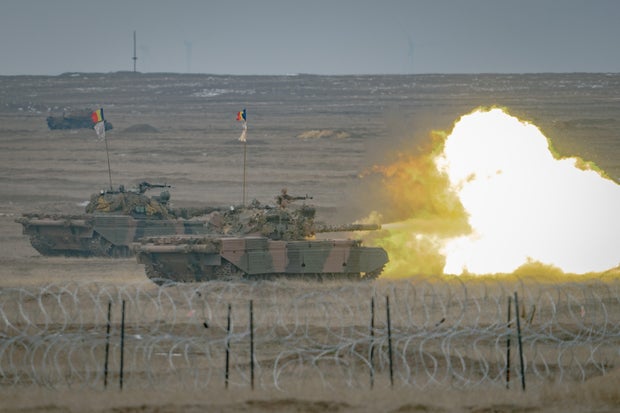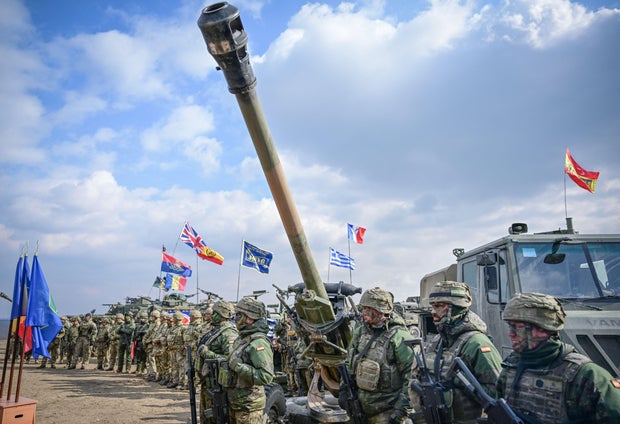Smardan, Romania — Near Romania’s border with Ukraine this week, about 10,000 troops from NATO’s Allied Reaction Force (ARF) rehearsed how they’d respond to a sudden attack from an adversary like Russia. Tanks, fighter jets, bomb disposal squads and attack helicopters all took part in the live-fire drills, while medics set up mobile hospital units.
Nine allied countries participated in the weeks-long exercise, called Steadfast Dart 25, which saw large-scale, rapid personnel and equipment movements across Europe continent through the close coordination of the allied militaries.
The United States was not one of the nine countries that took part in the exercise, but its role as the longtime cornerstone of the NATO alliance was a focal point among journalists gathered to view a demonstration of the ARF’s capabilities on Wednesday. That was just hours after President Trump blamed Ukraine, and its President Volodymyr Zelenskyy specifically, for the war sparked by Russia’s February 2022 full-scale invasion.
“Intense” talks in Kyiv amid Trump-Zelenskyy tension
Mr. Trump went on to blast Zelenskyy as an ineffective leader, even calling him a “dictator,” as the Ukrainian president said the American president was living in a “disinformation space” created and fostered by Russia. Ukraine has fumed at being left out of the Trump administration’s initial talks with Russia, which Mr. Trump claims are going very well and can bring a ceasefire deal, suggesting only Zelenskyy is standing in the way.
Retired U.S. Gen. Keith Kellogg, Mr. Trump’s envoy to Russia and Ukraine, has been in Kyiv this week and held meetings with Zelenskyy and other top officials. He was expected to hold a joint news conference with Ukrainian officials on Thursday, but Kyiv said the U.S. had cancelled it. In a social media post, however, Kellogg struck a different tone than Mr. Trump.
Kellogg said it had been a “long and intense day,” but that his discussions with Zelenskyy, “the embattled and courageous leader of a nation at war and his talented national security team,” were “extensive and positive.”
Reacting in his own post on social media, Zelenskyy agreed that the talks had been intense, but said his meeting with Kellogg, “restores hope, and we need strong agreements with the U.S. — agreements that will truly work. I have instructed my team to work quickly and very sensibly.”
“We follow the orders of our duly elected officials.”
U.S. Navy Admiral Stuart Munsch, commander of JFC Naples, one of NATO’s three Joint Force Commands, which manages the Allied Defense Force, was in Romania to oversee the exercises. He was asked about Mr. Trump’s shift away from U.S. support for Ukraine, and toward Russia’s longtime talking points on the war.
“Your president thinks that Ukraine was essentially asking for it [the war]. So do you think it was an unprovoked invasion and why are you disagreeing with your president?” a British journalist asked Munsch during a news conference.
“NATO consists of 32 countries, and it’s NATO’s position that it was unprovoked,” Munsch responded.
Andrei Pungovschi/Bloomberg/Getty
The U.S. and Canada are the only non-European members of the North Atlantic Treaty Organization, which was formed in 1949 in the wake of World War II. The alliance has played a vital role in maintaining peace in Europe since then, largely thanks to the collective defense clause in Article 5 of NATO’s founding charter, which essentially says an attack on one ally will be treated as an attack on all.
“As a political and military alliance, what we do together at NATO directly contributes to the security, the prosperity, and liberty of the people of the United States and every Ally,” the U.S. mission to NATO says on its website. “NATO promotes democratic values and encourages consultation and cooperation on defense and security issues to build trust and, in the long run, prevent conflict. NATO is committed to the peaceful resolution of disputes. If diplomatic efforts fail, it has the military capacity needed to undertake crisis-management operations.”
Mr. Trump has long argued that the U.S. has spent more than its fair share on what he considers Europe’s defense, and that European NATO allies should bear more of the financial burden.
“The entire NATO alliance is basically structured around the United States,” Max Bergmann, the director of the Europe, Russia, and Eurasia Program and the Stuart Center in Euro-Atlantic and Northern European Studies at the Center for Strategic and International Studies (CSIS), told CBS News. “All NATO planning is dependent on the United States… Everyone else sort of docks in, are kind of the limbs, but it’s the U.S. that does the basics of blocking, tackling, enabling Europeans to fight together.”
Bergman says, however, that this is how the U.S. has historically encouraged the alliance to function.
“That’s how the U .S. has been approaching Europe — is to say: ‘We want you to spend more, but we want you to be utterly dependent on us,'” Bergman said. “And what has happened over the last 10 years, is Europe has been doing that. They’ve been spending more. They’ve been providing a lot of aid to Ukraine. But they haven’t taken, really, any significant steps to organize themselves to be independent. And now the Trump administration comes and says, ‘Well, we’re basically leaving Europe.'”
DANIEL MIHAILESCU/AFP/Getty
With the White House seeming to question the importance of NATO to U.S. national security, Bergman says there’s a “real sense of betrayal felt on both sides [of the Atlantic], and in Europe, I think the perspective is, yeah, we’re dependent on the U.S. for defense, and we should have done more, but that’s also how the United States has wanted us to be.”
At the NATO exercise in Romania, CBS News asked Munsch, who was there in his capacity as a NATO commander, about the apparent disconnect between messaging from the White House and the alliance, which has always emphasised the allies’ unity.
“There are discussions going on at the national level,” Munsch replied. “There have not been decisions made, so I’m executing currently orders that I have.”
He said it would be business as usual unless and until he received any new orders.
“That’s the way it is always, right?” Munsch said. “We follow the orders of our duly elected officials.”


